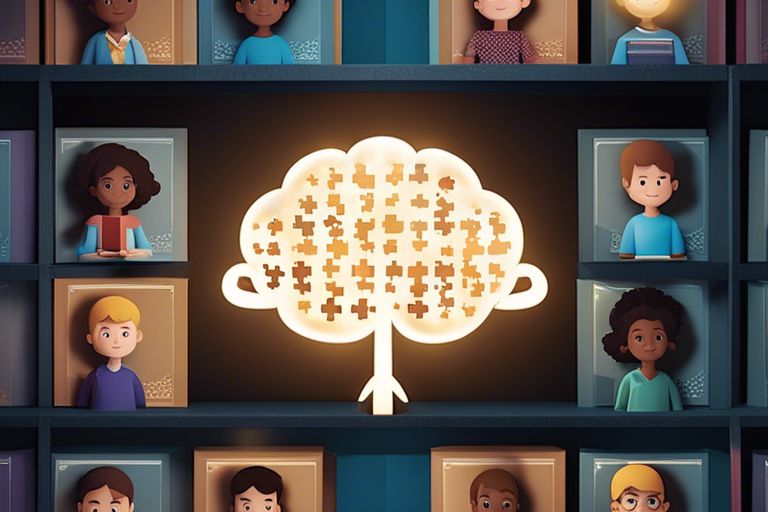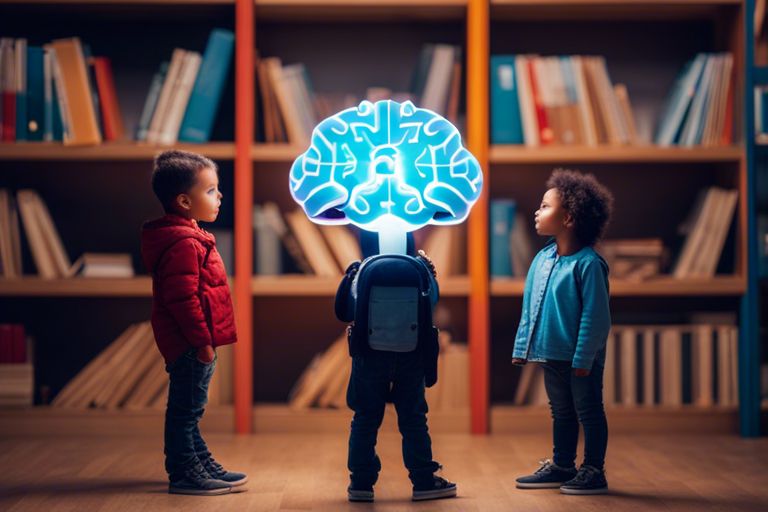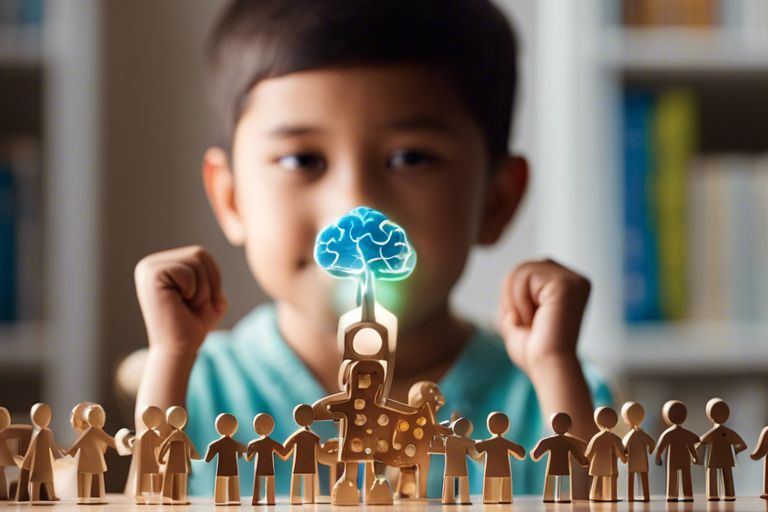Understanding how autism develops is crucial for parents and caregivers in order to provide the best support for individuals with autism. Autism is a complex neurodevelopmental disorder that affects communication, social interaction, and behaviour. It can manifest in a variety of ways and its causes are still not fully understood. The early signs of autism can be subtle, making it challenging to diagnose at a young age. However, early intervention and support can lead to positive outcomes for individuals with autism. To learn more about autism and how it develops, you can refer to this Complete Guide to Autism.
Key Takeaways:
- Genetic predisposition: Autism develops through a combination of genetic predisposition and environmental factors.
- Neurodevelopmental process: The journey of understanding autism involves a complex neurodevelopmental process that affects social interaction, communication, and behaviour.
- Early intervention: Early intervention and support play a crucial role in helping individuals with autism navigate their developmental journey and reach their full potential.

The Early Stages of Autism
Autism is a complex neurodevelopmental disorder that manifests early in a child’s life. Understanding the early stages of autism is crucial in providing timely support and interventions for affected individuals.
Recognizing Early Signs
Parents and caregivers play a vital role in recognising the early signs of autism in children. The key indicators may include difficulty with social interactions, delayed speech development, repetitive behaviours, and sensitivity to sensory stimuli. It is important to seek professional evaluation if any concerns arise regarding a child’s development.
Early intervention is critical in supporting children with autism. By identifying the signs early on, parents and healthcare professionals can create individualised strategies to help the child thrive and reach their full potential. Early detection and intervention have been shown to improve outcomes and enhance the quality of life for individuals with autism.
The Role of Genetics in Autism Development
Genetics play a significant role in the development of autism. Research indicates that various genetic factors contribute to the risk of autism spectrum disorder. While the exact genetic mechanisms are complex and not fully understood, studies have identified certain gene mutations and variations that are associated with an increased susceptibility to autism.
Children with a family history of autism are at a higher risk of developing the disorder, highlighting the importance of genetic predisposition. Understanding the genetic underpinnings of autism can guide future research and potentially lead to more targeted treatments and interventions tailored to individuals based on their genetic profile.
The Impact of Environment and Interactions
Prenatal and Postnatal Influences
During prenatal development, genetic and environmental factors play a crucial role in influencing the risk of autism. Factors such as maternal health, nutrition, exposure to toxins, and infections can all contribute to the likelihood of a child developing autism. Similarly, postnatal influences like early childhood experiences, social interactions, and exposure to stressors can also impact the development of autism.
The interplay between genetics and environment is complex and not fully understood yet. However, it is clear that both prenatal and postnatal factors can significantly influence the development of autism.
Socio-Environmental Triggers and Autism
Socio-environmental triggers refer to external factors in a person’s social environment that may contribute to the development of autism. These triggers can include exposure to pollution, parental stress, socioeconomic status, and access to healthcare and support services. It is important to acknowledge the role of socio-environmental factors in the development of autism alongside genetic predispositions.
Research has shown that early intervention and support for families can improve outcomes for individuals with autism. By addressing socio-environmental factors, we can positively impact the lives of those affected by autism and help them thrive in their journey towards understanding and acceptance.

The Diagnostic Journey
As we investigate into the intricate journey of understanding autism, one of the pivotal phases is the diagnostic process. Diagnosing autism is a complex and crucial step towards providing individuals with the necessary support and interventions. The journey of diagnosis can vary for each individual, but there are common threads that weave through the experiences of many families.
Screening and Assessment Processes
Screening and assessment processes play a fundamental role in identifying the signs and symptoms of autism. During screening, healthcare professionals use specific tools and questionnaires to evaluate a child’s behaviour and development. If concerns are raised during screening, a more comprehensive assessment is conducted by a multi-disciplinary team, which may include psychologists, speech therapists, and paediatricians.
Following standardised assessment tools and guidelines is crucial for an accurate diagnosis. Professionals look for a range of behaviours and characteristics that are indicative of autism spectrum disorder, such as challenges in social interaction, communication difficulties, and repetitive behaviours. Early detection through rigorous screening and assessment processes can lead to timely interventions that can significantly improve outcomes for individuals with autism.
Challenges in Diagnosis
Despite advancements in understanding autism, challenges in diagnosis still exist. Factors such as variability in symptoms and presentation, lack of awareness among healthcare professionals, and cultural misconceptions can lead to delayed or missed diagnoses. Additionally, co-occurring conditions like ADHD or anxiety disorders can mask the core symptoms of autism, making it more challenging to untangle the complexities of an individual’s behaviour.
Moreover, accessing timely and appropriate diagnostic services can be a struggle for many families, especially in rural or underserved areas. The process of obtaining a diagnosis can be emotionally taxing for families already navigating the complexities of raising a child with developmental differences. Advocacy and awareness are essential in addressing these challenges and ensuring that individuals with autism receive the support they need.
Therapeutic Interventions and Support
When it comes to supporting individuals with autism, therapeutic interventions play a critical role in enhancing their development and improving their quality of life. Various approaches to treatment have been developed to address the unique needs of those on the autism spectrum, providing tailored support to help them thrive.
Approaches to Treatment
Behavioural therapies are commonly used to target specific behaviours and teach new skills to individuals with autism. These therapies are evidence-based and focus on reinforcing positive behaviours while reducing challenging ones. Additionally, communication therapies such as Speech and Language Therapy help individuals develop their verbal and nonverbal communication skills, improving their ability to interact with others.
The Importance of Early Intervention
Early intervention is crucial in supporting individuals with autism as it can significantly impact their long-term outcomes. Early identification and intervention can help in addressing developmental delays, improving social skills, and enhancing communication abilities from a young age.
Research has shown that early intervention programmes can lead to improved cognitive function, better social integration, and increased independence in individuals with autism. Therefore, identifying and providing support as early as possible is key to promoting positive developmental outcomes for individuals with autism.

Living with Autism
Living with autism can present unique challenges for individuals and their families. It is important to understand the daily struggles faced by autistic individuals and how society can support them in leading fulfilling lives.
Understanding Daily Challenges
Autistic individuals often face difficulties in social interactions, communication, and sensory processing. Simple tasks that may seem ordinary to others can be overwhelming for someone with autism. Establishing routines and providing clear instructions can help alleviate some of the anxiety and confusion that can arise from unpredictable situations.
Moreover, sensory sensitivities can lead to sensory overload, making it difficult for autistic individuals to concentrate or engage in certain environments. Creating sensory-friendly spaces and accommodating individual needs can significantly improve their daily experiences.
Supporting Autistic Individuals in Society
It is essential for society to embrace neurodiversity and create inclusive environments that cater to the needs of autistic individuals. Education and awareness play a crucial role in promoting understanding and acceptance. By providing appropriate support and opportunities for growth, we can help autistic individuals thrive and contribute to society in meaningful ways.
Furthermore, advocacy for policies that protect the rights of autistic individuals and promoting inclusion in various societal settings are vital steps towards building a more accommodating and supportive community for everyone.
Advances in Research
As our understanding of autism continues to evolve, so does the research aimed at unravelling the complexities of this neurodevelopmental disorder. Advances in research have provided valuable insights into the underlying mechanisms of autism, shedding light on its causes, symptoms, and potential treatments. Scientists and healthcare professionals are working tirelessly to improve our knowledge of autism spectrum disorder (ASD) and enhance the quality of life for individuals on the spectrum.
Recent Discoveries in Autism Science
Recent discoveries in autism science have highlighted the role of genetics, environmental factors, and brain development in the manifestation of ASD. Studies have identified specific genes that may contribute to the risk of autism, as well as the impact of prenatal exposure to certain substances on brain development. Understanding these intricate interactions is crucial for developing more targeted interventions and personalised therapies for individuals with autism.
The Future of Autism Understanding and Care
In the future of autism understanding and care, a multidisciplinary approach involving genetics, neuroscience, psychology, and education will be crucial for making significant strides in the field. Collaborative efforts between researchers, clinicians, educators, and policymakers are essential for improving early detection methods, enhancing intervention strategies, and promoting inclusive environments for individuals with autism. Advancements in technology are also playing a key role in revolutionising the way we diagnose and support individuals with ASD, offering new tools and platforms for assessment, communication, and skills development.
The Journey of Understanding – How Autism Develops
Understanding the development of autism is crucial in providing better support and interventions for individuals on the spectrum. From genetic factors to environmental influences, various elements play a role in the complex journey of autism development. By delving deeper into the mechanisms behind autism, we can enhance our knowledge and empathy towards those with autism, ultimately creating a more inclusive and supportive society for everyone.
FAQ
Q: What is autism?
A: Autism, or autism spectrum disorder (ASD), refers to a broad range of conditions characterised by challenges with social skills, repetitive behaviours, speech and nonverbal communication.
Q: How is autism diagnosed?
A: Autism is typically diagnosed through a combination of developmental screenings, comprehensive evaluations, and observations of the individual’s behaviour and communication patterns.
Q: At what age can autism be detected?
A: Autism can be detected as early as 18 months of age, but most children are diagnosed between the ages of 2 and 3 years old.
Q: What are the possible causes of autism?
A: The exact causes of autism are still not fully understood, but a combination of genetic and environmental factors are believed to play a role in its development.
Q: How does autism develop over time?
A: Autism is a lifelong condition that can evolve and change over time. Early intervention, therapies, and support can help individuals with autism develop coping mechanisms and improve their quality of life.
Q: What are some common signs of autism in children?
A: Common signs of autism in children include delayed speech and language skills, difficulty with social interactions, repetitive behaviours, and intense focus on certain interests.
Q: How can family members and friends support individuals with autism?
A: Family members and friends can support individuals with autism by educating themselves about the condition, being patient and understanding, promoting communication and social skills development, and seeking professional help and resources when needed.







